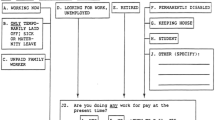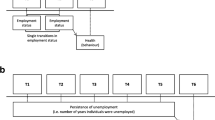Abstract
Objectives
We examined health selection in the context of transitions across employment statuses (employment, unemployment and inactivity), with attention to gender differences.
Methods
60,536 transitions from 7,901 individuals were pooled from 17 waves of the British Household Panel Survey. Associations between self-rated health and transitions across employment statuses were examined using multilevel multinomial analysis.
Results
Health selective employment transitions between year t-1 and t were observed at entry to as well as exit from employment. Associations for poor health with the transitions were similar for men and women in transitions from employment to both unemployment and to inactivity, but with some differences in other transitions. When leaving employment, transitions from employment to unemployment (ORadjusted(adjusted odds ratio) = 1.51, 95 % CI = 1.21–1.89 for men and ORadjusted = 1.60, 95 % CI = 1.25–2.04 for women) and to inactivity (ORadjusted = 1.58, 95 % CI = 1.21–1.89 for men and ORadjusted = 1.63, 95 % CI = 1.35–1.96 for women) were affected by health status among both men and women. Similarly, poor health lowered the probability of transitions to employment from unemployment and inactivity; however, the negative impact of poor health was statistically significant only for women.
Conclusions
There is a strong relationship between health and transitions both into and out of employment suggesting an independent role for poor health, and these associations were similar for men and women.
Similar content being viewed by others
References
Acheson D (1998) Independent inquiry into inequalities in health. Great Britain. Her Majesty’s Stationery Office, London
Åhs A, Westerling R (2006) Self-rated health in relation to employment status during periods of high and of low levels of unemployment. Eur J Public Health 16(3):294–304
Alavinia SM, Molenaar D, Burdorf A (2009) Productivity loss in the workforce: associations with health, work demands, and individual characteristics. Am J Ind Med 52(1):49–56
Arber S (1996) Integrating nonemployment into research on health inequalities. Int J Health Serv 26(3):445–481
Arrow JO (1996) Estimating the influence of health as a risk factor on unemployment: a survival analysis of employment durations for workers surveyed in the German Socio-Economic Panel (1984–1990). Soc Sci Med 42(12):1651–1659
Baldwin ML, Johnson WG (2000) Labor market discrimination against men with disabilities in the year of the ADA. South Econ J 66(3):548–566
Bartley M, Ferrie J, Montgomery S (1999) Living in a high-unemployment economy: understanding the health consequences. In: Marmot M, Wilkinson R (eds) Social determinants of health. Oxford University Press, Oxford, pp 81–104
Boles M, Pelletier B, Lynch W (2004) The relationship between health risks and work productivity. J Occup Environ Med 46(7):737–745
Bound J, Schoenbaum M, Stinebrickner TR, Waidmann T (1999) The dynamic effects of health on the labor force transitions of older workers. Labour Econ 6(2):179–202
Bradley CJ, Bednarek HL, Neumark D (2002) Breast cancer survival, work, and earnings. J Health Econ 21(5):757–779
Cardano M, Costa G, Demaria M (2004) Social mobility and health in the Turin longitudinal study. Soc Sci Med 58(8):1563–1574
Dahl E (1993) Social inequality in health–The role of the healthy worker effect. Soc Sci Med 36(8):1077–1086
Disney R, Emmerson C, Wakefield M (2006) Ill health and retirement in Britain: a panel data-based analysis. J Health Econ 25(4):621–649
Dwyer DS, Mitchell OS (1999) Health problems as determinants of retirement: are self-rated measures endogenous? J Health Econ 18(2):173–193
Elstad JI, Krokstad S (2003) Social causation, health-selective mobility, and the reproduction of socioeconomic health inequalities over time: panel study of adult men. Soc Sci Med 57(8):1475–1489
Findley PA, Sambamoorthi U (2004) Employment and disability: evidence from the 1996 medical expenditures panel survey. J Occup Rehabil 14(1):1–11
Flippen C, Tienda M (2000) Pathways to retirement: patterns of labor force participation and labor market exit among the pre-retirement population by race, Hispanic origin, and sex. J Gerontol B Psychol Sci Soc Sci 55(1):S14–S27
Gerdtham UG, Johannesson M (1999) New estimates of the demand for health: results based on a categorical health measure and Swedish micro data. Soc Sci Med 49(10):1325–1332
Grossman M (1972) On the concept of health capital and the demand for health. J Polit Econ 80(2):223–255
Holland P, Burstrom B, Moller I, Whitehead M (2006) Gender and socio-economic variations in employment among patients with a diagnosed musculoskeletal disorder: a longitudinal record linkage study in Sweden. Rheumatology (Oxford) 45(8):1016–1022
Jones AM, Koolman X, Rice N (2006) Health-related non-response in the British Household Panel Survey and European Community Household Panel: using inverse-probability-weighted estimators in non-linear models. J R Stat Soc Ser A Stat Soc 169:543–569
Jusot F, Khlat M, Rochereau T, Serme C (2008) Job loss from poor health, smoking and obesity: a national prospective survey in France. J Epidemiol Commun H 62(4):332–337
Karpansalo M, Manninen P, Kauhanen J, Lakka TA, Salonen JT (2004) Perceived health as a predictor of early retirement. Scand J Work Environ Health 30(4):287–292
Kasl S, Jones B (2000) The impact of job loss and retirement on health. In: Berkman L, Kawachi I (eds) Social epidemiology. Oxford University Press, New York, pp 118–136
Kessler RC, Barber C, Beck A, Berglund P et al (2003) The world health organization health and work performance questionnaire (HPQ). J Occup Environ Med 45(2):156–174
Lindholm C, Burstrom B, Diderichsen F (2001) Does chronic illness cause adverse social and economic consequences among Swedes? Scand J Public Health 29(1):63–70
Little A (2007) Inactivity and labour market attachment in Britain. Scot J Polit Econ 54(1):19–54
Loprest P, Rupp K, Sandell SH (1995) Gender, Disabilities, and Employment in the Health and Retirement Study. J Hum Resour 30:S293–S318
Lynn P, Buck N, Burton J, Laurie H, Noah Uhrig S (2006) Quality profile. British Household panel survey version 2.0: waves 1 to 13. Institute for Social and Economic Research. University of Essex, 2006
McDonough P, Amick BC (2001) The social context of health selection: a longitudinal study of health and employment. Soc Sci Med 53(1):135–145
Mosconi R, Seri R (2006) Non-causality in bivariate binary time series. J Econometrics 132(2):379–407
Mutchler JE, Burr JA, Massagli MP, Pienta A (1999) Work transitions and health in later life. J Gerontol B Psychol Sci Soc Sci 54(5):S252–S261
Ojeda VD, Frank RG, McGuire TG, Gilmer TP (2010) Mental illness, nativity, gender and labor supply. Health Econ 19(4):396–421
Rasbash J, Steele F, Browne W, Prosser B (2004) A user’s guide to MlwiN version 2.0. Centre for Multilevel Modelling
Robinson H (2003) Gender and labour market performance in the recovery. In: Dickens R, Gregg P, Wadsworth J (eds) The labour market under new labour, The state of working Britain. Palgrave Macmillan, Palgrave, pp 232–236
Sacker A, Clarke P, Wiggins RD, Bartley M (2005) Social dynamics of health inequalities: a growth curve analysis of aging and self assessed health in the British household panel survey 1991–2001. J Epidemiol Commun H 59(6):495–501
Schultz AB, Edington DW (2007) Employee health and presenteeism: a systematic review. J Occup Rehabil 17(3):547–579
Schuring M, Burdorf L, Kunst A, Mackenbach J (2007) The effects of ill health on entering and maintaining paid employment: evidence in European countries. J Epidemiol Commun H 61(7):597–604
Steele F, Goldstein H, Browne W (2004) A general multilevel multistate competing risks model for event history data, with an application to a study of contraceptive use dynamics. Stat Model 4(2):145–159
van de Mheen H, Stronks K, Schrijvers CTM, Mackenbach JP (1999) The influence of adult ill health on occupational class mobility and mobility out of and into employment in The Netherlands. Soc Sci Med 49:509–518
van den Berg T, Schuring M, Avendano M, Mackenbach J, Burdorf A (2010) The impact of ill health on exit from paid employment in Europe among older workers. Occup Environ Med 67(12):845–852
Virtanen P, Liukkonen V, Vahtera J, Kivimaki M, Koskenvuo M (2003) Health inequalities in the workforce: the labour market core-periphery structure. Int J Epidemiol 32(6):1015–1021
Acknowledgments
The BHPS data were made available through the UK Data Archive. The data were originally collected by the ESRC Research Centre on Micro-social Change within the Institute for Social and Economic Research at the University of Essex. Neither the original collectors of the data nor the archive bear any responsibility for the analyses or interpretations presented here. The authors are grateful to both organizations for allowing access to the data and to all participants in the BHPS survey. This research was supported by Graduate School Research Scholarship and Overseas Research Student Award from University College London awarded to MK.
Author information
Authors and Affiliations
Corresponding author
Rights and permissions
About this article
Cite this article
Ki, M., Kelly, Y., Sacker, A. et al. Poor health, employment transitions and gender: evidence from the British Household Panel Survey. Int J Public Health 58, 537–546 (2013). https://doi.org/10.1007/s00038-012-0437-y
Received:
Revised:
Accepted:
Published:
Issue Date:
DOI: https://doi.org/10.1007/s00038-012-0437-y




